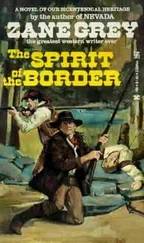Herman Whitaker - Over the Border - A Novel
Здесь есть возможность читать онлайн «Herman Whitaker - Over the Border - A Novel» — ознакомительный отрывок электронной книги совершенно бесплатно, а после прочтения отрывка купить полную версию. В некоторых случаях можно слушать аудио, скачать через торрент в формате fb2 и присутствует краткое содержание. Жанр: foreign_prose, foreign_adventure, на английском языке. Описание произведения, (предисловие) а так же отзывы посетителей доступны на портале библиотеки ЛибКат.
- Название:Over the Border: A Novel
- Автор:
- Жанр:
- Год:неизвестен
- ISBN:нет данных
- Рейтинг книги:3 / 5. Голосов: 1
-
Избранное:Добавить в избранное
- Отзывы:
-
Ваша оценка:
- 60
- 1
- 2
- 3
- 4
- 5
Over the Border: A Novel: краткое содержание, описание и аннотация
Предлагаем к чтению аннотацию, описание, краткое содержание или предисловие (зависит от того, что написал сам автор книги «Over the Border: A Novel»). Если вы не нашли необходимую информацию о книге — напишите в комментариях, мы постараемся отыскать её.
Over the Border: A Novel — читать онлайн ознакомительный отрывок
Ниже представлен текст книги, разбитый по страницам. Система сохранения места последней прочитанной страницы, позволяет с удобством читать онлайн бесплатно книгу «Over the Border: A Novel», без необходимости каждый раз заново искать на чём Вы остановились. Поставьте закладку, и сможете в любой момент перейти на страницу, на которой закончили чтение.
Интервал:
Закладка:
Built in a great square, its massive walls, a yard thick and twice the height of a man, formed the back wall of the stables, adobe cottages, storehouses, and granaries on the inner side. It also lent one corner to the house which rose above it to a second story. Pierced for musketry, with a watch-tower rising above its iron-studded gates, it was, in the old days, a real fort. Besides the long row that followed the meanderings of a dry water-course across the landscape, a cluster of giant cottonwoods raised their glossy heads within the compound, shading with checkered leafage the watering wells and house. Set amidst growing fields of corn and wheat at the foot of a range that loomed in violet, crimson, or gold, according to the hour, it was as pleasant a place as ever a man looked upon and called his home.
Carleton smiled as she added, “I’d hate to have been brought up in El Paso or any other prosy American city.”
He might have replied that there were American cities she might find less prosy than El Paso. But he was well content to have her think as she did.
His own gaze, overlooking the prospect, expressed the pride of accomplishment with which men survey their completed work; nor was his satisfaction less because the buildings themselves were not of his creation. Coming here, sixteen years ago, with a nest-egg of two or three thousand dollars, he had leased and let, bought and sold with Yankee shrewdness; added acre to acre, flock to flock, until, at last, he was in position to buy Los Arboles from a “land-poor” Spanish owner.
To a man without imagination the fact that its foundations had been laid almost four centuries ago by one of Cortés’s conquistadores might have meant little. With Carleton it counted more than its broad acreage. From a trove of old papers left by the former owner he had gathered many a story of siege and battle, scandal and intrigue, consummated within its massive walls. Instead of fairy-tales, he had told these to Lee during her childhood, so that medieval atmosphere had penetrated her very being.
They seldom overlooked the hacienda , as now, without making some observations anent its past. As in some vivid pageant, they saw the old Dons, their señoras , señoritas , savage brown retainers, in the midst of their fighting, working, loving, praying. By self-adoption, as it were, Carleton, at least, had allied himself with them, had come to think of himself as belonging to the family.
“Great old fellows they were!” Though he spoke musingly, now, without connection, she instantly caught his meaning, knew he was harking back. “Great old chaps! I was looking into one of our land titles the other day, and the records read in princely fashion. ‘Between the rivers such and such, of a width that a man may ride in one day,’ that was a favorite method of establishing boundaries. No paring of land like cheese rinds; everything done by wholesale; no haggling over a few square leagues.”
“And here comes one of them.” Lee pointed her quirt at a horseman who had just topped the opposite rise. “Doesn’t he look it?”
Surely he did. The charro suit of soft tanned deerskin with its bolero jacket and tight pantaloons braided or laced with silver; the lithe figure under the suit; dark, handsome face, great Spanish eyes that burned in the dusk of a gold-laced sombrero ; the fine horse and Mexican saddle heavily chased in solid silver; the gold-hilted machete in its saddle sheath under the rider’s leg, even the rope riata coiled around the solid silver pommel, horse, rider, and trappings belonged in that pageant of the past.
“It is Ramon Icarza,” Carleton nodded. “He hasn’t been here for a long time.” This he repeated in Spanish when the young man rode up.
“Attending to the herds and the horses, señor. As with you, the most of our peones have run away to the wars. We have left only a few ancianos too feeble and stiff to be of much service. Still, with the aid of the women we manage. That last requisition for the” – his shrug was eloquent in its disdain – “ cause . You paid it?”
“Had to – or be confiscated.” With a grin comical in its mixture of amusement and anger, Carleton went on, “I raked up five thousand pesos of Valles’s money and took it to him myself. And what do you think he said? ‘I don’t want that stuff. I can print off a million in a minute. You must pay me in gold.’”
Perhaps because humor has no place in the primitive psychology of his race, Ramon received the news with a black frown. “The devil take him! Yet you Americans are better treated than we, his countrymen. With us, he takes all. Those poor Chihuahua comerciantes!” His hands and eyebrows testified to Valles’s scandalous treatment of the merchants. “First he demands a contribution to the cause . Those who refuse are foolish, for first he shoots them as traitors, then confiscates their goods. But the poor devils who contribute, see you, fare little better; for with the money he runs off a newspaper press he buys up the goods they have left. In the old days we used to curse the locusts, señor; but they, at least, left us our beasts and lands. Who would have thought, four years ago, that you and the señorita here and my venerable father would be reduced to become herders of cattle?”
“Oh, but it’s lots of fun!” Lee’s happy laugh bespoke sincerity. “I love it out here. They will never be able to get me back in the house. And that reminds me that we’re almost due there for lunch.”
“You’ll stay, of course, Ramon?” Pointing to a couple of mares with foals they had brought in from a distant part of the range, Carleton added, “There’s still another over in the next valley. If you will take these along, I’ll get her.”
Left to themselves, the young man and girl headed the mares toward the hacienda , riding sufficiently in rear to check the sudden, aimless boltings of the foals. The helplessness of the little creatures touched the girl’s maternal instinct, and though their stilts of legs, wabbly knees, long necks, and big heads were badly out of drawing, she exclaimed like a true mother over their beauty.
“Oh, aren’t they pretty!”
Ramon agreed – as he would had she called upon him to admire a Gila monster. Not that he had always followed her lead. Close neighbors – that is, as neighboring goes in range countries where distance is reckoned by the hundred miles – their childhood had compassed more than the usual number of squabbles. Until the dawn of masculine instinct had bound him slave to her budding beauty, they had upset the peace and dignity of many a ceremonial visit by fighting like cat and dog. Lee knew, of course, his mother and sister, and not until she had extracted the last iota of family gossip did she bestow a sisterly inspection on himself and clothes. Having passed favorably on the material, fit, and trimmings, she reached for his sombrero .
“You are quite the hacendado, now, Ramon, in that magnificent hat. Let me look at it. What a beauty!”
While she turned and twisted it, fingered the rich gold braid, examined it with head slightly askew like a pretty bird, the natural glow intensified in Ramon’s big dark eyes; a wave of color flowed through the gold of his skin. His mouth – too red and womanish for Anglo-Saxon standards – drew into a tender smile.
According to the cañons of fiction, this was wrong. A man with a black or brown skin must reserve his admiration for women of his race. Yet, with singular disregard, for writer’s law, Nature continued to weave for Ramon her potent spells. The sunshine snared in Lee’s hair, rose blush of her skin, her womanly contours, the fine molding of her limbs, the sweetness of youth, all the witcheries of form and color with which Nature lures her creatures to their matings, affected the lad just as powerfully as if he had been born north of the Rio Grande.
Читать дальшеИнтервал:
Закладка:
Похожие книги на «Over the Border: A Novel»
Представляем Вашему вниманию похожие книги на «Over the Border: A Novel» списком для выбора. Мы отобрали схожую по названию и смыслу литературу в надежде предоставить читателям больше вариантов отыскать новые, интересные, ещё непрочитанные произведения.
Обсуждение, отзывы о книге «Over the Border: A Novel» и просто собственные мнения читателей. Оставьте ваши комментарии, напишите, что Вы думаете о произведении, его смысле или главных героях. Укажите что конкретно понравилось, а что нет, и почему Вы так считаете.












